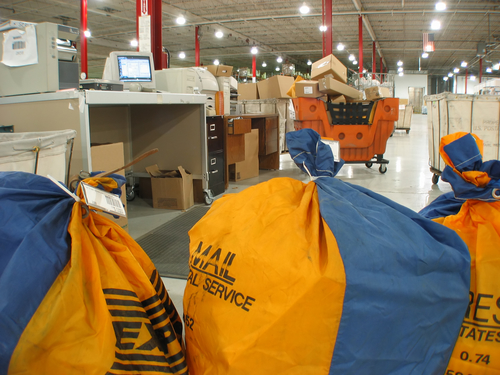
Leadership from several federal government agencies signed an agreement to collaborate to prevent products that pose a threat to public health from entering the U.S. through International Mail Facilities.
The memorandum of understanding (MOU) — signed by the U.S. Food and Drug Administration, the U.S. Customs and Border Protection (CBP), and the U.S. Immigration and Customs Enforcement, Homeland Security Investigations (ICE-HSI) – calls for maximizing inspection and detection capabilities to prevent this illegal activity.
The MOU seeks to target illicit opioids, including fentanyl and other unapproved or unlawful drugs, medical devices, and dietary supplements regulated under the Federal Food, Drug, and Cosmetic Act. The agencies will work to coordinate ongoing activities through information sharing, shared facilities, and future coordinated operations.
“Americans must have confidence that the products they receive are reliable and fully comply with U.S. laws,” FDA Commissioner Stephen Hahn said. “The collaborative efforts we’ve announced will enable more resourceful, effective, and efficient oversight to prevent illegal and potentially harmful products from entering the United States—thereby aiding our essential mission to protect the health and safety of the American people. We remain committed to using all tools and authorities available and leveraging our strong relationship with our federal partners to help stop the illegal flow of counterfeit and unapproved medical products into our country.”
Through this MOU, the FDA, CBP, and ICE-HSI will expand the types of information shared among the agencies to quickly and effectively identify trends in incoming violative packages.
“International mail and express consignment are major conduits for drug smugglers. This has become more challenging for law enforcement as volumes have skyrocketed, and because of e-commerce and rapid shipping logistics,” CBP Acting Commissioner Mark Morgan said. “This partnership with FDA and ICE will ensure a whole-of-government approach that will provide additional resources and tools to disrupt these dangerous drugs from reaching our communities.”
Since April 2016, the FDA has destroyed more than 12.9 million violative drug units destined for over 31,000 U.S. consumers. In 2019, the FDA screened approximately 25,200 parcels containing more than 41,000 products at its IMF facilities. It refused to admit more than 35,000 of those products, and nearly half were identified as violative drugs and destroyed using the FDA’s administrative destruction authority. In 2020, the FDA has screened approximately 27,500 mail parcels, containing almost 43,000 FDA-regulated products. More than 34,000 were refused admission of these products, and more than 24,000 were violative drug products that have been destroyed.
“FDA and CBP are key partners in our mission to protect against counterfeit goods that could cause harm,” Senior Official Performing the Duties of the Director Tony Pham said. “ICE HSI special agents investigate and enforce violations of federal trademark, copyright, and patent law and work to dismantle counterfeit operations and hold individuals involved in them accountable – mitigating risks to legitimate business and ensuring public safety.”




